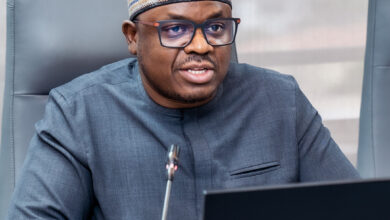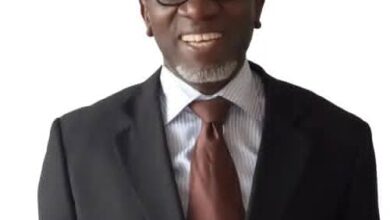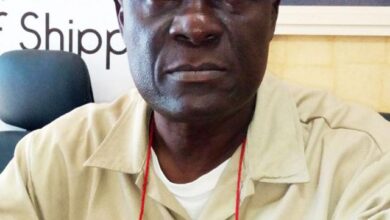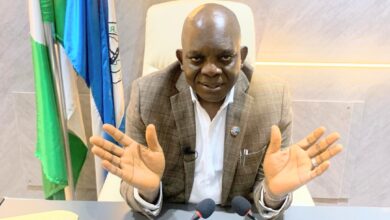Interview: Nigeria,Benin Customs Pact Will Grow Economy, Curb Smuggling ,Promote Integration -Nnadi

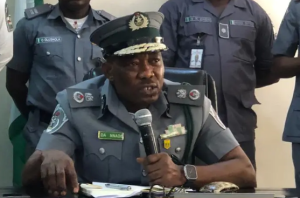
Dera Anselm Nnadi, Customs Area Controller of Tin Can Island Port Command spoke with reporters on assumption of office on Thursday . Nnadi who was overseeing customs activities at Seme/Krake border until last week, gave an insight into the recently endorsed pact between the leadership of Nigeria Customs Service and Benin Republic Customs
Harmonising prohibition lists, removing perceived barriers to trade,relying on the SIGMAT innovation to track goods in transit and preventing smuggling were some of the gains he listed as fallouts from the bilateral talks
Ismail Aniemu was there.
Q: Coming from Seme Border at a time Nigeria and Benin Customs administrations signed a pact on trade, what is in it as benefit for Nigeria and how best can this talk address issues arising from goods in transit?
The leadership of Benin Customs were here as a follow up to earlier visit to them by our CGC. Now after that ,ask yourself if we manufacture goods in Nigeria and we have excess where do we take them to?Are you taking them to Europe where they already have those goods?
The things we take away from here to Europe mostly are oil, gas and raw materials.Can you take Coca cola to the US where the headquarters of Coca-cola is? Is it possible to take furniture from here to Europe , Turkey, Morocco? Can you take textile from here to China ? Think about it.Those that would buy these things from us are our neighbours.

However, my experience with Seme Border is that goods move from Gambia, Togo, Senegal, Ivory coast, Burkina Faso to Nigeria and they pass through Benin.
If they must pass to Niger too in transit, being a landlocked country, they pass through Benin into Nigeria before entering Niger and we thought about it that these people are strategic partners.If they close their borders the way we closed ours , what happens?
You don’t take it for granted because when I went to Seme the impression is that agreement in real term is to promote regional trade and don’t forget, we will still enter Africa Continental Free Trade Area (AfCFTA)Agreement. All it will take this people to do is to invite companies to establish in their own countries and manufacture .
Everything manufactured in Africa when this thing takes place is now duty free. what do you do? Start protecting.We also found out that most of the business challenge we have is that what we prohibit in Nigeria come into Benin freely .
Used clothing comes there freely, they didn’t prohibit it.Frozen poultry products which we ban comes in there freely.They didn’t prohibit it.Parboiled rice comes in there freely of which we have banned completely from land or sea port.They don’t prohibit it but it comes there.Used vehicles of certain age come in there.
The question is when these things land in Cotonou with their small population, why do they end up here Nigeria?
We then said instead of deploying several resources to checkmate this ,why not get smart about it? They offered this idea that we can come to their country and examine these things and stop it there before it comes here.That was a good idea.The main clause for us is that we are harmonizing our prohibition list .
Whatever we prohibit in Nigeria, they will also prohibit.That is the first gain we are making.They have also offered that if you are in Nigeria and you import something that is not prohibited through their port, Nigeria Customs Service can come into their port in our own uniform and they will examine the container, the agent will pay duty there, and the money will be transferred to Nigeria.
But they asked for something.They said we know that one of the main things that they do is rice.If they decide to ban rice importation as we have banned it ,how do they survive? They said it should be graduated.
Not that we will just say no more rice from Cotonou. It is a sovereignty , if we stop it, we can say if we are importing 5 tons a year, we can start by saying we will reduce it to 3 this year, they will compensate us .Next year we will reduce by 1, they will compensate us until within a time frame we will stop importing completely.By then we must have found alternative for our economy.That is what they are saying.It is not as if Nigeria is losing.
Someone said we are taking our market and our labour to Benin Republic.Why not? Life is about competitiveness and that is where all of you here will help.Why is it that from here to Ghana by ship is 2 hours and 3 hours maximum? Why is it that from here to Cotonou port by ship is 1 hour maximum? Why do our people prefer to go to Cotonou to clear their Cargo? That means our business process here should be addressed.
If we put our house in order, would anyone go outside to buy.We both have water.If Niger goes to Cotonou to import, I can understand because they are landlocked.What about we that have water here and six ports or more? That means we should do something here collectively.
When they closed Niger border, some people came to Seme to say can we pass through Seme and I said why not? It’s free but I asked a man why he is not passing through Nigerian Ports because he wants to move Cargo from Cotonou, to Sokoto ,to Kastina , why didn’t he pass through our ports here to Sokoto and the man said which road would he pass through? For the man, his challenge is not the maritime industry, his challenge is the road and infrastructure.I asked about what he will do when he moves from Cotonou port and he said he will offload into trucks and go to Kastina and Sokoto through Niger border .I asked why he can not do the same thing here and not pay for demurrage.He said before he gets to Kastina from here, pilfering, damage and insecurity will stop him because the road is not good.He said from there he can travel even if it is longer, he can travel to Kastina and his goods will be intact.
We need to address some of these infrastructural and social deficits . Talking about interconnectivity, we have it and it is part of the company that is called SIGMAT.People were asking for reasons why we are using SIGMAT and why can’t we get our own ICT infrastructure? SIGMAT is actually an ECOWAS product.Even some of our Customs officers from Nigeria are part of the development.Somehow, we didn’t key in.Burkina faso, Ghana, Senegal, Ivory coast, Cotonou are all using SIGMAT to connect.As part of this agreement, we are working on SIGMAT.As a matter of fact, even while we were holding that meeting, ECOWAS and our officers were working on it and we will soon key in too.
Q: With this now, are you saying very soon the border will be open to importation of vehicles, and rice ?
This thing they said is an agreement that the framework for its actualization is yet to start.But the media has already written it as if the meeting will start tomorrow.No
A committee will still be set up.Government will have to endorse it.It is just like an idea based on the fact that it is already working elsewhere .Other countries in Africa are doing some of these things.
If you go from your port to another person’s port to carry container, you will pay before it comes to your own place.Other countries are doing it .That is regional integration.Those of you that travel intercontinental, if you fly Lufthansa from here, they will check you in Nigeria and the next check will be in Frankfurt and once you are checked in Frankfurt, nobody checks you again in other European countries.That is exactly what we want to do.If you are carrying Potato from Denmark to Belgium, once they check you between Denmark and Belgium, until the Potato enters London, France, or USA , nobody checks you again.Why can’t we do it here? Why are we always making things look so difficult?
We are not bringing rice , they are saying they will stop importing rice for our sake since we don’t want it.It is not automatic but it is a proposal made and we both signed to commit to that proposal.If the committee works out,we will achieve it ,that is just what we have done.Another thing which we discussed that is very important is transit fees .If you are moving Cargoes from Ivory coast for instance to Nigeria like Lever Brothers or Cardbury for example, not the exact figure please.Assuming you pay 2 Naira as transit charge administrative charges from Ivory coast to Togo to Ghana, that same Cargo you are paying 2 Naira for each country, the moment you get into Benin Republic, it increases from 2 Naira to N1000.That is what we are protesting.They over charge Nigerian goods in transit.Where other countries like Ghana are charging us 5 Naira, Togo will charge us 5 Naira.Once it enters Cotonou, it becomes N10,000 .It is part of what we discussed that they should also reduce but they also complained that when they come to Lagos to buy things, and they want to go back to their country, we have more than 80 check points that also allegedly collect money from their traders and there is no receipt issued.We also agreed that we will remove those check points.
We removed check points, barriers to trade, they will also reduce cost of transit.Someone is giving something and the other is taking just like what we are doing but nobody has opened the border for things to start coming in.
By September 29th the committee will start sitting while the ICT people are meeting.
Q:I want us to look at the area of the revenue as it concerns Tin Can.You know some years back the Central Bank of Nigeria excluded 41 items from assessing forex
What it means is that the importers would have to go to black market to buy dollars so they’ll bring.. Can this be reviewed?
Part of the challenges that traders are having now is floating exchange rate.Before, there were about 4 tiers of exchange rate.We had the government rate, student rate, customs rate , we have the one for those who want to pay children’s school fees abroad, the one for those who are traveling, for black market.But with floating exchange rate, everything has collapsed.
Hitherto, before you can transfer $10, 000 to pay your children’s school fees, it was a big deal.Now, that window has been given to you.Go to the bank and transfer money to your children based on what you have . Before, you have to apply to CBN .It will take time.You can queue for up to 2-3 months and you will not be given window to your children’s school fees.The floating exchange rate has accommodated that already.The idea was that the importers of 41 items cannot source money from government to import them.That window has been thrown open for everybody.
However, for every policy, if there is government issue there must be reversal.Perhaps at the end of this year, we will announce the next fiscal policy maybe they will revisit it and say even though we are floating naira this particular policy based on this , we are officially withdrawing it.
When you source your own money, Customs is not stopping you from traveling with it.That is another misconception people have.Declare your income source to customs and we will sign the fund if the money is so much.If you have at least $10, 000, and you don’t declare, we will seize it .I am looking forward to the day we will be able to export more than we import.That is part of my dream which we are doing all we can to discourage import and consume locally.
Q: Don’t you think this pact will adversely affect ports in Nigeria and make our country a dumping ground of some sort
Competitiveness is the soul of business. This fear came up when we were about to start ETLS and when we were debating on Trade Facilitation Agreement TFA.People were asking how Nigeria will become a dumping ground.
The idea is competitiveness.I asked a question that what makes Cotonou port attractive and ours not attractive.It is a simple thing.If you are the port operator here, and you are scared that because of that you can’t compete then make your place conducive for trade. It is about competitiveness.
We should improve our business process so that we can attract patronage.There are some airlines that are very cheap but someone can decide not to buy their tickets but rather buy expensive ticket because the route is either shorter or the services rendered by the people are better.
Before this policy was made, Nigerians have been going to the Cotonou port before now, the question is why were they going there in the first place.It is not as if it is something new, and I have cited an example of regional integration everywhere in the world.
This is just part of it .We should remove some of these fears that we have and believe that it is good for the sub-region . Sometimes, we should also not act selfishly by saying we can’t do it.If you see the volume of trade going on across the border, even when we think nothing is happening you will know the economic significance of the countries around us .
Imagine if Benin says Dangote should not pass through their place again to supply cement to Togo.On daily basis, 25 Dangote trucks cross the border .What if they tell them that they can’t cross again? They are not the ones buying the cement.They supply to other countries but they must pass through their road .
We should not think we are losing trade here by going there and through their own corridor you are providing employment for people in Dangote. There is no ship that will transport those things from here to those countries.
In the past, if you want to fly to Niger, you will first fly to France and then fly back to Niger .Can you see the importance of regional integration? I can now fly from Abuja to Niamey in Niger ,to Togo and other places.There is no cargo that can take ship from here to Ghana directly.






